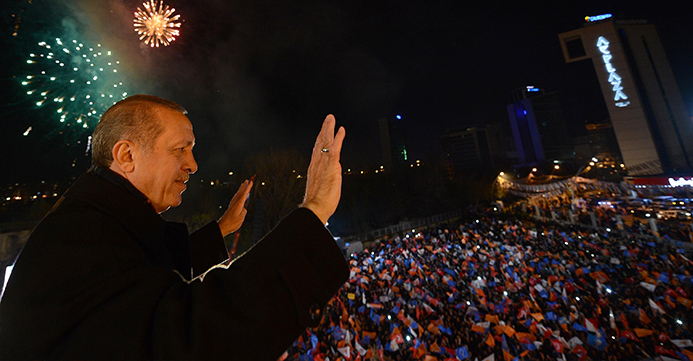One of the most significant elections in Turkey’s recent political history is over. These are the first elections after the Gezi Park incidents of last year and the Dec.17 operation against the government and the last elections before the first direct presidential elections will be held.
As I wrote on election night, the results mean a vote of confidence for the AK Party government in general and Prime Minister Recep Tayyip Erdoğan in particular. This victory of the AK Party also has kicked off some other discussions regarding presidential elections and the state of the political system in Turkey today.
The results of the local elections show a very powerful comeback on the part of Erdoğan. Although his party was never defeated in elections some circles assumed that he would face a critical defeat in the local elections, which would also impact his political career.
Erdoğan’s electoral victory has now sparked discussions regarding the presidential elections. The local election results demonstrate that, if he is willing, Erdoğan can be the most significant candidate in presidential elections and even likely win outright in the first round of it. Of course if he runs, then another question emerges in regard to potential replacements for the position of prime minister. Moreover, the discussion over potential strategies for opposition parties in presidential elections also began last week.
Even before the elections, there have been debates about supporting one candidate in the elections. But the implementation of this strategy may also have consequences for the future of these political parties, which itself raises many different questions.
The debates on presidential elections are not limited to the names and personalities that will occupy the most significant executive positions. The issue of the presidential elections also raises significant questions about the nature of the political system in Turkey. Since the constitutional change on the election of the president many questions have been posed regarding the nature of political system in Turkey. Although some still prefer to classify it as a parliamentary system, in practice the system will become a semi-presidential system after the election of the president directly by the people this August. This new system will bring different questions regarding executive power of the president as well as the relationship between the president, prime minister and cabinet.
It is obvious that there will be a constitutional amendment that will remove the requirement for presidents to quit from political parties. If there will be campaigns for presidency, it will be political parties that will run these campaigns and such a constitutional limitation will create practical problems.
In addition to that, there may be some other amendments which aim to clarify the division of labor between different branches of the executive and eliminate potential adverse effects of semi-presidentialism, such as deadlocks that frequently happens in countries with presidential system due to disputes between the prime minister and the president.
In this process, the nature of the system will also have an impact on the existing literature of semi-presidentialism. The practices of semi-presidentialism in different countries demonstrate variation from one country to another. There may be innovative approaches in the new model that will minimize the adverse effects of the system.
In fact, the emerging political system in Turkey can be a totally new and blended Turkish semi-presidential system.
In the coming months, different scenarios regarding the configuration of the new system and potential changes in the political system will be discussed among policy makers, political scientists, political observers and journalists. In the meantime we will also disc
In this article
- Domestic Policy
- Opinion
- December 17
- Election
- Elections
- Istanbul
- Local Elections
- May 28-August 20 2013 The Gezi Park Protests
- Opposition
- Presidential Government System
- Prime Minister
- Recep Tayyip Erdoğan
- taksim
- The President of the Republic of Türkiye
- Turkish Local Elections
- Turkish President
- Türkiye's Justice and Development Party | AK Party (AK Parti)



